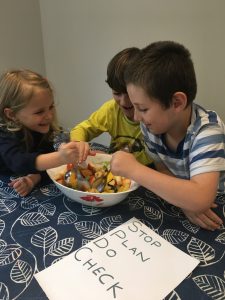Physical Literacy
Physical Literacy can be described as the motivation, confidence, physical competence, knowledge and understanding to value and take responsibility for engagement in physical activities for

DCD is a chronic motor skill disorder seen in children and youth, which significantly affects activities of daily living, school performance, and leisure activities.
The disorder is diagnosed by a paediatrician or sometimes jointly between an educational psychologist and occupational therapist using the DSM-5 criteria:
(a) A significant difficulty learning and carrying out skills that require motor coordination (taking into consideration the child’s age and opportunity for skill learning).
(b) The motor skills deficits significantly and persistently interfere with everyday tasks (activities of daily living) in the home, play and school environments.
(c) The onset of symptoms becomes apparent in early childhood.
(d) The motor skills deficits are not due to: an intellectual disability, visual impairment, neurological or medical condition affecting movement.
Developmental Coordination Disorder (DCD) is a formal and defined condition. Dyspraxia is not. Dyspraxia is a term used to describe a difficulty with coordinated motor planning or lack of praxis.
Poor attention and concentration: Children with DCD need to put in a lot more effort than other children to perform seemingly simple motor tasks. Due to this effort, they can fatigue easier and it can be more difficult to engage in sustained auditory attention. Some children also struggle with processing sensory information.
Speech, language and social skills difficulties: Gross and fine motor difficulties, poor planning and sensory integration difficulties can make it difficult for a child to engage in playground games or activities. Some children with DCD also have speech and language difficulties which affect their ability to communicate and interact with their peers.
Auditory processing difficulties: Some children struggle to block out background noise (both in the classroom and in the playground), follow rapid speech or conversations from multiple speakers.
Behavioural and emotional difficulties: Some children have a high level of frustration and reduced motivation. Others report psychological issues, including significantly higher levels of anxiety or depression and decreased quality of life than their peers.
A 4-step strategy for learning a new task:
(1) Stop – Stop to think (What am I going to do?)
(2) Plan – How am I going to do it?
(3) Do – Go ahead and do it. Comment while you are doing the task.
(4) Check – Recall the steps. How did my plan go? Recognise what went well/wrong.
Written by: Aled Hughes & Marinet Brennan
For ideas on how to develop ‘Movement and Listening Skills’ at home, please go to our YouTube channel:
https://www.youtube.com/channel/UCpc_nE7ejnXc89dosXIXZYw?view_as=subscriber
Throughout our podcasts we will also endeavour to illustrate the importance of movement as a foundation skill to learning: Move to Learn, Learn to Move.
To listen to Aled Hughes and Marinet Brennan’s podcasts on the topic of ‘Movement and Listening’ click on the Apple / iTunes Podcast link below. You can also find us on Spotify.
https://podcasts.apple.com/ie/podcast/codex360/id1531481578
https://open.spotify.com/show/3Fx5U7bfGAJTAsXE9QwlVr?si=SE-aMsKLRpaC1R2i8F1QJw
Physical Literacy can be described as the motivation, confidence, physical competence, knowledge and understanding to value and take responsibility for engagement in physical activities for
“The most powerful tool for fostering the growth and development of neural connections in your child’s brain is physical movement.” (Gill Connell, child development expert)
When you read to your child you are helping your child’s mind grow and develop. Reading aloud to your child helps your child learn more
“Reading to your child from an early age is one of the most important things you can do to help prepare your child for mastery
What is Developmental Coordination Disorder (DCD)? DCD is a chronic motor skill disorder seen in children and youth, which significantly affects activities of daily living,
Move to Learn & Learn to Move: movement and literacy Sometimes life is so busy
Fill in your details and we’ll get back to you in no time.